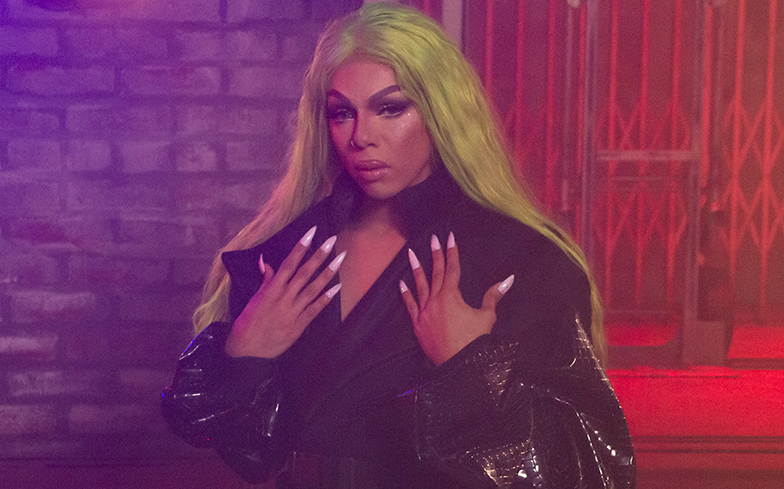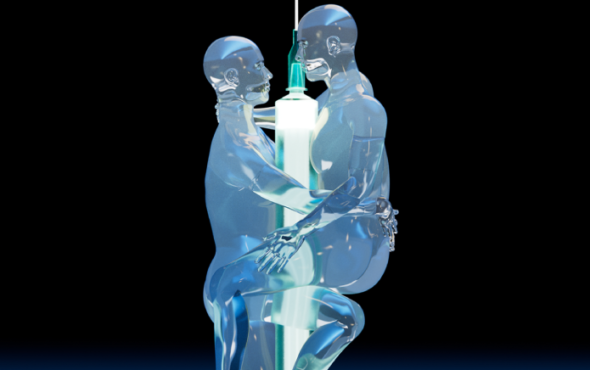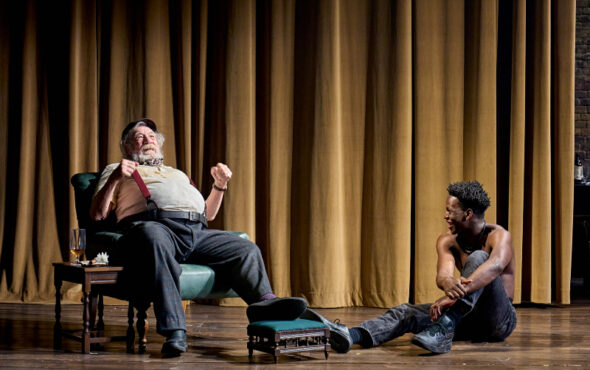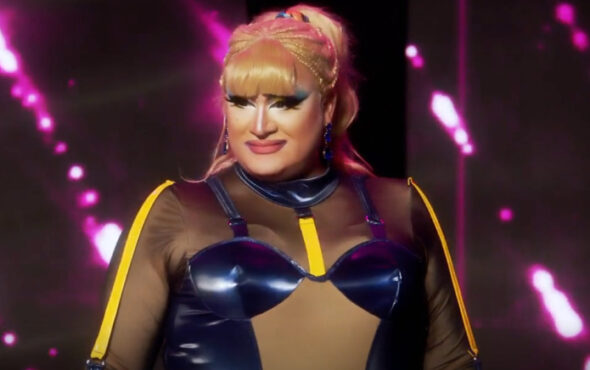
“If I ever go on any press outlet and they wanna talk about my dick, I’m just gonna be like, ‘Unless you wanna get on your hands and knees right now and suck my dick then don’t ask me about my fucking genitals.'”
Since Aja shot to fame on the ninth season of Drag Race and its acclaimed spin-off series, All Stars 3, the sickening performer has made their mark in the music industry with several rap-dance bops such as Brujeria, Level Ya Pussy Up and Ayo Sis.
Today, however, sees the release of their long-awaited debut album, Box Office, which features legendary artists such as Rico Nasty, former Gay Times cover star CupcakKe and their season nine sister, Shea Coulee.
Despite flourishing in the dance genre, Aja tells us that the album more accurately represents them and their New York City origins. “I feel like my EP was catering to an aesthetic that people got to see me through reality television,” they tell us. “Box Office speaks more about me as a person.”
In celebration of the release, we caught up with Aja to discuss their music (ofc), drag being much more than gender transformation, and why they’ll pull a Naomi Campbell on you if you ask them about “dick and pussy”.
Why did you decide to call your album Box Office?
The idea behind was it to get people to see through my scope a little bit. When you go to the show, you have to go to the box office, and the entire album has a recurring theme of music that’s themed by media and movies. Even some of the tracks are named after some of those movies, like Breakfast at Tiffany’s, Kill Bill.
You have the incredible Cupcakke on the album. How did that collaboration come about?
I have always loved Cupcakke because I feel like she appeals to the queer community, and she has a big LGBTQ fanbase. Also, I worked with Cupcakke a few years ago when she flew into my DMs on Twitter, and she was like, ‘Hey, I’m doing this show in New York. I would love if you and your girls came out.’ She paid us to be on stage with her and chill. It was really fun, so I loved that chemistry and I think she is one of the most talented rappers right now. Especially, it’s really hard to be a woman in rap, so I feel like she really trumps all of people’s expectations.
Yeah, and she raps about topics so unapologetically, and it feels like you’re also doing this as a non-binary drag performer of colour.
At this point time in time, I don’t really look at myself as a drag performer, I prefer music. I’m not really invested in the art of drag, but more-so as a means of presentation. But, I do feel like for femininity in a genre like hip-hop and rap, it’s always going to be harder to get recognition or be backed by someone who’s big in that game. I feel like the best rappers, lyricists are the people who serve something different. I don’t think I’m the best at anything by any means, but I do hope that I can contribute something different to the genre. Ideally, I would love people to look at my music as real hip-hop, because it is where I come from. It is something that I love and ultimately, I hope people view it that way. Even if they don’t, I don’t really care, I want people to realise that queer people can do hip-hop as well and to stop hating on femme artists in the genre.
Your EP had more of a club sound. Is Box Office the real you?
Yes. I feel like my EP was catering to an aesthetic that people got to see me through reality television. Box Office is an actual album. It’s something where I get to show people who I am. I didn’t say much about myself personally on my EP, even though it’s called In My Feelings! I feel like the EP spoke more about my temporary aesthetic. Box Office speaks more about me as a person.
For the album, you collaborated with your season nine sisters, Shea Coulee on Breakfast at Tiffany’s, and Farrah Moan for the Jekyll & Hide video. How come you wanted to work with those two in particular again?
When I think of people I want to work with, it’s always people who I feel like I will have good chemistry with or who I feel will mesh well with my brand. Shea Coulee has always been complimentary of me, we both come from a similar background, being people of colour, but we represent two different sides of the spectrum. With Farrah, we were on tour together and around each other a lot, and I was like, ‘You know what? You’re a really good friend and I have this idea for this stupid, kinda campy themed video.’ I said, ‘Would you be down’ and she said yes. When it comes to people who I wanna collaborate with, especially people I was on TV with, I don’t think about it as like, ‘Oh, we were on TV together, let’s do this.’ I feel like it has to match the moment and it has to match the theme, and it has to make sense. I’m such a Capricorn, complicated person! Not in the terms of doing things, but in terms of being organised.
Who else would you like to work with in the industry?
I would definitely like to collaborate with any of the big female rappers, like Nicki Minaj. I’ve always been a big fan. I’m really loving Cardi B, she’s doing something for herself. But at the same time, I do have a lot of masculine rappers I would like to work with as well, like Tyler the Creator, Jay-Z. Some of these collaborations are a little less realistic than others! But I say nothing’s impossible, and if you really want something and put it out to the universe, you never know… you might just get it.
Rap and hip-hop aren’t known for being inclusive of the LGBTQ community. Do you feel like, with this album, you’re challenging that?
I feel like it’s not necessarily my mission to challenge any boundaries, I just feel like my existence does that on its own. I’m just honestly following my passions and my goals, and really just trying to be happy and at the same time, uplift other people around me to follow their dreams as well. If I can fulfil my goals and somehow push these boundaries, and make it easier for other people, then you know what? That’s a great added bonus and I love that.
There aren’t many actual drag artists who have made it mainstream. Do you think the media has a problem with taking drag performers seriously?
Oh, a lot of drag artists have made it big in mainstream media! Gaga’s famous, Nicki’s famous, those are drag queens love! Prince is famous, David Bowie is famous, these are all drag artists! People think we’ve never seen drag in the media, that’s all drag. She’s wearing a wig, she’s wearing make-up, she’s wearing intense fashion. It’s a form of drag, and I think even people like Bowie and Prince, even Marilyn Manson, they’ve all played with the idea of gender. It’s always been a thing, so I think people have made it into the mainstream. I do feel like it depends on the person. Some people are really comfortable staying underground, and there’s some people who do aim for that kind of mainstream success.
You’ve been in the music industry for a few years now. Have you faced many obstacles being a non-binary performer of colour?
I don’t necessarily have an official industry backing, but I do feel like there is an expectation for people like me. I have people who’ve slided into my DMs and I get messages like, ‘Let me write music for you!’ I write my own music, first of all, but these people have a very specific vision of how they want to portray me. And it’s always like this same narrative of how a queer person of colour should sound, and it’s always heavily ballroom influenced or something of that sort. That’s not really me? It’s a part of where I grew up, but me as an artist, I feel like my music is more New York hip-hop. Anybody who’s from New York can listen to my sound and if you’ve never seen my image, you don’t know who I am or who Aja is, you can listen and be like, ‘This person is born in New York.’
You write all your music, and you previously said you posted music on Tumblr as a form of helping you through depression and anxiety. How has your art helped your mental health?
I feel like music is such a good medium to express how you feel. I’ve always been drawn to music in some way, whether it was through dancing, DJ-ing, producing, but when you get to write music and rap, you’re literally digging into the deepest and rawest parts of your emotions. That’s really what I used to do when I was younger. I had a lot of feelings that I wanted to put down. I didn’t wanna be aggressive and mean to people and I didn’t wanna take my anger out on my family and friends, I wanted to put it in music. For a while, that’s what I did, and yes it’s on Tumblr. I’ll never release a link! It’s all really bad! I’ll just say there was some evolution and character development there… Sometimes I’ll go back and just laugh and be like, ‘Oh God’.
Did doing drag and music help you discover your gender identity?
Yes, I definitely think it has. When I first started writing my EP, I literally got in my feelings and got really confused. I have identified as someone who’s very non-binary. I’ve been gender-fluid for years, but at that point, when it came to writing music, I thought that my writing comes from a feminine and masculine point of view. I went through this crisis where I realised I don’t have to please anybody, I just wanna express myself. If anything, it helped me become more comfortable with the identity that I already had.
In your visuals, such as your videos and album artwork, you appear as Aja and also male-presenting. Was that important for you to do?
It’s important. A lot of people may not realise this, but the idea of Aja as a drag queen doesn’t really exist because Aja is not really a drag queen, Aja’s just me. I don’t know how to explain it. I’m just Aja, and I’m wearing different clothes, and it doesn’t matter if my hair is long or short, it doesn’t matter if I have make-up on, if I have a dress or a pair of pants. It’s the same person, it’s the same story, it’s going through the same shit, eating the same food, the same heart beating. It’s not a character. A lot of drag queens put on a character. I think that’s what separates me from them. There’s no separation.
You also said you found it misogynistic and transphobic for people to ask you to only appear in drag. Is this a problem you encounter quite frequently?
I understand why people would feel opted to want me to present in drag, and it’s obviously because I appeared on reality television in drag. But I think what people don’t realise is that drag, to a lot of people, not just me, is more than just an art-form or a form of entertainment. My drag is a vehicle and an identity for me. I don’t get in drag to please people, I get in drag to represent as feminine. I think that people get that confused, and they’re like, ‘Okay, I want you to come onto our press outlet in full drag at 7am and we want you to talk about how your dick is up your ass, how you’re tucked, and we wanna talk about the whole transformation. How often are you a boy? How often are you a girl?’ I don’t like that because it doesn’t speak about the person as a person, you’re looking at the person as basically a clown. You’re not looking at them as a human. You’re basically saying, ‘You’re here for my entertainment, you’re a jester, dance little bitch, dance.’ I’m nobody’s performing monkey, and nobody is. And I feel like a lot of people, especially drag performers, either don’t care or they’re not willing to say anything because they’re like, ‘Oh, well this is how it’s supposed to be!’ But I feel like a lot of it has to do with the commercialisation of drag and more cisgendered, heterosexual people finding out. They are more fascinated with shit that has nothing to do with them. It’s the same people that think the trans community is all about genitals. Let’s be real, not everything in life is dick and pussy. These are people. Like, how would others like it if someone identified every part of your being by your dick and balls?
Do you think we’ll ever get to a point where those inappropriate questions are no longer asked?
Absolutely we are going to get to that point whether people like it or not. Because goddamn right, if I ever go on any press outlet and they wanna talk about my dick, I’m just gonna be like, ‘Unless you wanna get on your hands and knees right now and suck my dick then don’t ask me about my fucking genitals.’ I will pull a Naomi Campbell in five seconds and look at someone, look at my publicist, and walk off. Trans people, queer people and drag queens should not be reduced to social gender constructs. If you’re interviewing a person, you’re interviewing a person for who they are. Even the art-form of drag, there’s more about gender transformation. I feel like it all contributes to the narrative of misogyny in drag. It’s the same thing that attributes to why people are so against queens who were assigned female at birth. It’s the same concept, because people will be like, ‘Where’s the transformation?’ Drag is not about transformation, it’s just an art-form of expression.
The main source of drag is of course, Drag Race, and it mostly presents feminine presenting queens. Do you think it’ll take a while for fans to realise drag is not just a female illusion?
I hope so. Courtney Act is doing a great job advocating that message, but then I feel like there’s other drag queens who aren’t doing shit. They’re just like, ‘I got famous on Drag Race and all I care about is making my money.’ To me, that is upsetting because those are the people who really have a voice and could be saying something, and they’re just not saying nothing. You know who needs to speak up? It’s the queens who have big followings and the queens who everyone drools over, the queens who have so much privilege, because people look at them. If The Vixen speaks up, nobody’s gonna listen. But let’s be real, if a white queen did as much shit as The Vixen did, they would have let her fly. Why is it that people cancel The Vixen after like two weeks, but it took them a year and a half to cancel Eureka? Why is that a thing?
This was also an issue on the season ten reunion, where The Vixen – who had highlighted so many race issues within the Drag Race fandom – was targeted harder than Eureka.
Again, it’s all privilege. Privilege flies especially in Drag Race fanbases these days. People give any leverage to any white presenting queen, and when there’s a person of colour, they’re always ‘angry’. They’re always doing ‘too much’, they’re always ‘controversial’. They will cancel a person of colour in five seconds, but a white queen will always have a few more bridges to burn before they reach the last bridge. As much as we don’t want that racism, it’s always going to thrive. What we can do at least from our point of view and our community, is educate the people we know. As long as you’re educating people around you, you’ll know that you are surrounded by people who know better.
And finally, what can we expect from you in 2019?
You can expect music, fun fashion, music videos, a lot of content… I’m working on a lot of fun stuff and a lot of collaborations and I have a secret project on the go. I’m working on a lot of press, magazine stuff. I feel like 2019 is honestly just the beginning. I’m here to achieve my goals.
Aja’s debut album Box Office is now available on iTunes and streaming services.
Watch their gag-worthy visual for Jekyll & Hide (feat. Shilow) below.






